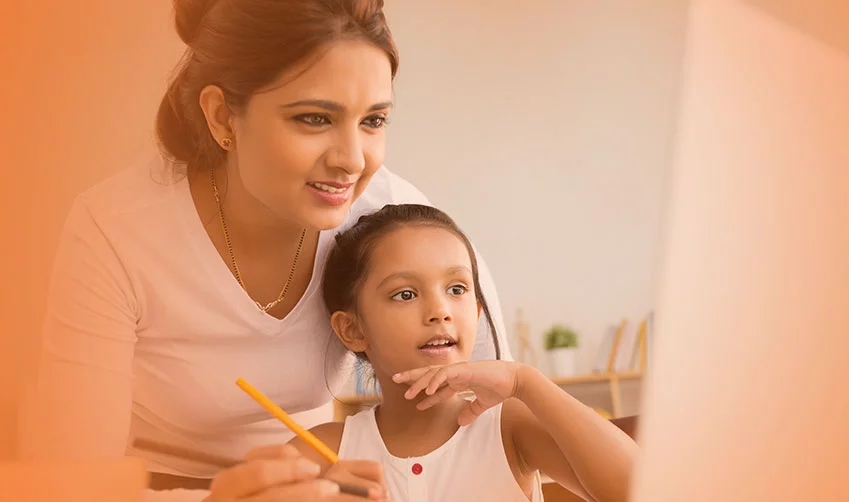On International Literacy Day, a look at how LEAD’s digital classes narrowed the digital divide in India’s hinterlands
.png)
Give Your School The Lead Advantage
The International Literacy Day this year is focused on ‘Literacy for a human-centred recovery: Narrowing the digital divide’. The years 2020 and 2021 have thrown light on the inequitable opportunities to education: elite institutions and schools in big cities have adapted to digital classes in a fairly seamless manner, while their counterparts in small cities and towns languished.
Pandemic and the digital divide
The pandemic has made the differences in opportunities in literacy and education starker, showing how our students in small cities and towns are left behind due to the digital divide. The lockdowns spelt extensive shutdowns for schools that were ill-equipped to embrace digital classes.
Low network connectivity, poor infrastructure, lack of technological solutions, and gaps in digital literacy are some of the reasons for these extended school shutdowns in Tier 2, 3, and 4 India. Digital classes, when conducted by some of these schools, did not adequately address students’ unique needs as simple tools like video conferencing and Google Docs failed to make any significant impact. As a result, learning gaps widened and digital classes seemingly served little purpose but to keep students occupied while their busy parents worked remotely.
With our ERP system, pedagogical practices, and enhanced teacher support, LEAD has been able to bring impactful digital classes to students in its partner schools. Even as the country was going into lockdown, we formulated resilient strategies that would tide our children over the next year (and more) and innovated on them at a regular pace.
Here are some ways LEAD-enabled digital classes met our children’s remote learning requirements, empowered teachers to do their best, and addressed learning gaps to improve literacy in rural schools:
- Recorded classes for education continuity
The moment the country went into lockdown, LEAD quickly created recorded videos of lessons for our partner schools when digital classes were not an immediate option. This helped both students to continue their lessons at home as well as gave teachers and schools enough time to get technology training in place. Recorded videos also ensured children learnt at their own pace as their parents grappled with the realities of remote work and the absence of daycare.
- Multimodal learning to suit every child’s needs
If Mitra responds well to hearing her teacher explain a theory, Sameer grasps concepts beautifully when he watches a short video. In other words, each child learns differently. For us in the education space, this is perhaps the most important thing to keep in mind. With the benefit of digital classes, LEAD has empowered schools to provide multimodal learning resources to their students. Audio clips, short explainer videos, gamified learning, the Practice with Friends feature, personalised quizzes and assessments are all part of how children learn on the LEAD student app.
- Data analysis for targeted interventions
With an ERP system from LEAD, there is no guesswork in imparting education to students. Their literacy and numeracy levels can be easily gauged from various touch points with LEAD’s technology solutions. Data from assessments, engagement with the LEAD app and during digital classes, and feedback from teachers are all collected to paint a 360-degree portrait of each student’s learning indicators. This knowledge is then shared with the teacher to equip her to pay individual attention to the student. Addressing gaps this way ensures they don’t stack up for years, as is the common case for most students.
- Addressing summer slide and learning gaps
According to a KPMG report released in 2020, extended lockdowns “is set to have a lasting impact on a child’s socio-emotional and mental health as well as on overall learning outcomes, with the potential to widen the disparity for children from disadvantaged backgrounds.”
This academic regression—noticed in students in all kinds of schools—is similar to the summer slide, which is basically learning loss during the summer vacations. A 2020 study of children in Classes 3-5 revealed that students on average lost 20 per cent of school-year gains in reading and 27 per cent of school-year gains in math during summer break.
Addressing both summer slides and learning gaps due to the pandemic is LEAD’s multi-pronged approach to addressing learning loss. Our six-week summer programme–which keeps students engaged in fun ways during the holidays–coupled with assessments at the beginning, middle, and end of the school year lets us identify learning gaps as and when they occur. This ensures any learning loss for children missing out on digital classes are addressed when they return to school.
- Making learning fun and couched in the real world
Several studies have shown that one of the most effective ways of increasing literacy levels among children is to make learning fun, interactive, and incidental. Even before the digital classes due to the pandemic, our curriculum enabled partner schools to teach children in a way that they can relate lessons to the real world. Be it fractions or astronomy, everything is taught in a practical manner. ELGA is another LEAD endeavour that has empowered our students in remote towns and villages to pick up English as a skill rather than learning it through rote methods.
A path to human-centred recovery from the pandemic is literacy and universal education. Innovating for low bandwidth and tech-shy audiences, LEAD is committed to closing the digital divide and bringing world-class education to every remote corner of India.
LEAD is transforming schools by making children future-ready. To make yours a LEAD Powered School: Partner with us today

.png)

